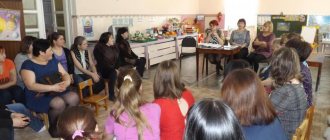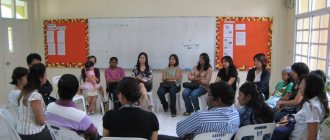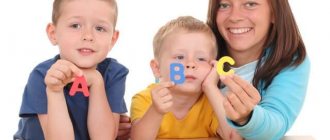Parent meeting in the preparatory group. Psychological readiness for school
Methodological development of a parent meeting in the preparatory group “Psychological readiness for schooling”
Author: Elena Petrovna Syrtseva, pedagogical psychologist, MDOU Kindergarten No. 7 “Petushok”, Yuryuzan Description of work: This methodological development quite fully reveals the concept of “psychological readiness” to school”, recommendations are given to parents on preparing their child for school. This material is intended for parents of future first-graders. It will be useful for educational psychologists and kindergarten teachers, as well as primary school teachers and school psychologists. Goal : to introduce parents to the concept of “readiness for school” Objectives: 1. To acquaint parents with the results of examination of children for school readiness 2. To acquaint parents with the difficulties that a first-grader child may encounter 3. To provide recommendations for preparing a child for school in at home Proceedings of the meeting: The child goes to first grade. During this period, parents have a lot of worries: they need to buy clothes, shoes, a backpack, and textbooks. But with all the parental concerns, I undertake to say that the child, a future first-grader, has much more worries than mom and dad. He enters a completely new world. What changes will happen in the lives of children when they start school? (parents answer, the psychologist writes on the board and summarizes)
- schooling is a new activity (learning) for the child, which causes a restructuring of the entire lifestyle.
The child is in a state of anticipation: something significant is coming, but so far unknown and uncertain. - the beginning of training is a big intellectual load - you need to concentrate during the lesson, memorize a large amount of information, do homework. — it is necessary to follow new rules of behavior, control your emotions; - establish contacts with the teacher and peers. — the child first finds himself in conditions where his knowledge and successes are assessed. All this creates significant stress on the child’s nervous system. - the child must maintain a forced position for 30 - 40 minutes - there is a restriction of motor activity - this is a load on the musculoskeletal system. In order for a child to cope with these difficulties, he must be ready for school. What criteria can be used to determine a child’s readiness for school? (parents answer, psychologist writes down)
Are you preparing your children for school?
How do you prepare children for learning? (parents' answers)
Readiness to learn is a complex concept and covers all areas of a child's life.
There are such types of readiness as physical, psychological and special. 1. Physical readiness is determined by the state of health and the level of development of all body systems. It is at the age of 7 that the parts of the brain that provide systematic learning mature, the spine begins to ossify, and vision strengthens. However, frequently ill and physically weakened children, as well as children 6 years old, experience difficulties in learning 2. Special readiness - the ability to write, count, read. Currently, these skills of the child are also important during primary schooling. 3. But above all, psychological readiness . It lies in the fact that by the time a child enters school, the psychological traits inherent in a schoolchild must be formed. Important components of psychological readiness are intellectual, motivational, emotional-volitional and personal readiness. In order to assess the level of psychological readiness of the child for school, a psychological and pedagogical examination was carried out, the results of which you will learn about today. At the same time, the presence of knowledge was not assessed (does the child know letters, can he read and count), but the indicated components of readiness for school, since this is what will make it possible to easily adapt to school learning and quickly acquire reading, writing and counting skills. Thus, a child’s psychological readiness for school is determined not by a set of knowledge and skills, but by a certain degree of maturity of his brain structures. • Intellectual readiness is determined by the presence of knowledge about the world around us, a certain level of development of cognitive processes (memory, attention, thinking, imagination, perception), as well as the formation of educationally important qualities (the ability to listen, perform actions under dictation, independence when performing a task, arbitrariness) Results of diagnostics of the intellectual sphere
Recommendations for parents on the formation of intellectual readiness: 1.
develop your child’s speech: read books, discuss what you read, teach your child to ask and answer questions 2. constantly talk to your child, answer his questions, make sure your speech is literate and expressive 3. develop memory and attention, teach your child memorization techniques (divide the memorized material into parts, speak out loud, repeat the next day) 4. teach the child to observe the world around him, identify the properties and characteristics of objects 5. teach to compare and contrast objects, find their similarities and differences, recognize objects by given characteristics, classify objects into groups, analyze. 6. develop fine motor skills • The main thing a future first-grader needs is a desire to learn (motivational readiness). It includes: - the presence of cognitive interests (the child likes reading books, solving problems, performing other intellectual tasks); — understanding the need for learning as a mandatory, responsible activity; - minimal desire for gaming and other entertaining and entertaining (preschool) elements of activity; - emotionally prosperous attitude towards school. - desire to learn But the desire to go to school and the desire to study are two different things. A child may want to go to school because his peers go there, because it is better to be a schoolboy than a preschooler, because he doesn’t have to sleep at school, and finally because for school he will receive a new backpack, textbooks, pens, and notebooks. However, this does not mean that children have realized the importance of studying. They just realized that the status of a schoolchild is much higher than the status of a preschooler. But there are children who categorically do not want to go to school. The reason for the negative attitude towards school is the statements of parents, the experience of teaching older children at school and their impressions. Such a negative attitude towards school makes it difficult for the child to integrate into school life. Those. No matter how intellectually developed a child is, no matter how well he can read and write, without the desire to learn and gain new knowledge, he will not be successful in school, since the school environment will be a burden to him. Results of diagnostics of the motivational sphere.
We adults need to remember that a child’s attitude towards school is formed even before he goes to school, and we – parents and teachers – shape it.
Recommendations for parents on developing motivational readiness: 1. Talk with your child about school, talk about your school years, favorite teachers, look at your school photographs 2. Play school with your child 3. Read poems, stories about school. 4. Show interest in classes yourself, create a positive emotional background. • Emotional-volitional readiness – level of development of voluntary-controlled behavior. A child must be able to focus his attention on material that is not always interesting for a long time, strive to achieve a goal, obtain a certain result, strive to overcome difficulties, must be able to control his behavior and emotions during a lesson (discipline, organization and self-control develop at this age) - principle “I don’t want to, but I have to” As a rule, a child’s voluntary behavior is formed by the age of 6-7 years. Emotional-volitional readiness was assessed during observation of the child’s behavior during the examination and in classes, conversations with the teacher and using the methods “Graphic Dictation”, “House”, “Corrective Tests”. During the examination, I assessed how attentive he was, whether he could he acts on the instructions of an adult, organizes his activities in accordance with the task, monitors its results and compares them with a given model. It is on these parameters of the development of voluntariness, which is part of psychological readiness for school, that education in the 1st grade is based; Results of diagnostics of the emotional-volitional sphere
Recommendations for parents on the formation of volitional readiness: 1. Make sure that the child completes the task started to the end 2. Teach the child to keep personal belongings in order, in a certain place (organization) 3. Teach the child to make decisions independently (plan weekends, give independence when choosing clothes) 4. Play games with the child according to the rules, role-playing games in which there are rules and the child must subordinate his behavior to them.
This can be a game of school, store, hospital, as well as outdoor games with certain rules. Parents are quite capable of playing the well-known game “Yes and No, Don’t Say” with their child. 5.Also, the development of arbitrariness is facilitated by any actions according to a given pattern: drawing patterns, constructing from geometric shapes, folding paper. 6.Support your child in his desire to succeed. In every job, be sure to find something to praise him for. Remember that praise and emotional support (“well done!”, “you did so well!”) can significantly increase a person’s intellectual achievements. 7. Teach your child to react correctly to failures Your child ended up last in the game and pointedly refused to play with his friends any longer. Help him deal with disappointment. Invite the children to play again, but change the rules of the game a little. Let only the first one be considered the winner, and all others be considered losers. Celebrate everyone's success as the game progresses. Encourage chronic losers with hope. After the game, draw your child’s attention to how the other players reacted to the loss. Let him feel the intrinsic value of the game, not the winning. • Communicative readiness – a child’s ability to build relationships with adults and peers, i.e. how easily the child makes contact, whether new faces and the need to communicate with them cause him increased anxiety. This determines how the child will fit into the new team. Recommendations for parents on developing communicative readiness 1. Satisfy the child’s natural need for communication (if possible, answer the child’s questions, include him in joint activities, encourage his communication with peers). 2.Enrolling in school significantly changes a child’s life, but should not deprive it of diversity, joy, and play. A first grader should have enough time for play activities, for walks, and for communication. 3. Encourage your child’s participation in group activities and games. 4. Encourage role-playing games that develop communication skills, leadership qualities and the ability to submit (the ability to resolve conflict, give in or insist on one's own). 5. Teach your child to recognize and adequately follow the rules proposed by adults. • Study of self-esteem With optimal, adequate self-esteem, the child correctly correlates his capabilities and abilities, is quite critical of himself, strives to realistically look at his failures and successes. Inadequate self-esteem complicates the life of not only those to whom it is characteristic, but also those around him, those people who , in different situations - educational, everyday and others - communicate with them. Low self-esteem – leads to self-doubt, increased anxiety (I won’t be able to do this); Inflated self-esteem gives rise to conflict situations with others. Recommendations for parents on developing a child’s self-esteem 1. Accept the child as he eats 2. When giving a negative assessment of the child’s actions, you should not say: “You don’t know how to build, draw...”. In these cases, the child cannot maintain the motivation for this type of activity and loses confidence in himself, in his strengths and abilities. 3. It is impossible to allow a negative assessment of a child’s activities to extend to his personality, i.e. The child should be criticized for his behavior. Personality assessment blocks the child’s development and forms an inferiority complex, and, consequently, low self-esteem and level of aspirations. Objectively evaluate your child’s capabilities and abilities. 4. Try not to compare him with other children - only with himself. For example: “Today you completed this task much faster than yesterday!” This approach will focus your child on his own improvement. It often seems to us that when a child enters 1st grade, he becomes more mature. That on September 1 he will become a real first-grader, he will be happy to go to school, do his homework, and read books. But what's really going on? The child remains the same preschooler, since it is impossible to become a schoolchild in one day. And exactly at this time. In the first year of schooling, a child needs the support and help of parents. Because the success of the first year of study will determine your studies in subsequent years. Now I suggest you conduct a small experiment. Take a pencil and write: “My child is a future first-grader.” Now switch the pencil to your other hand and write this phrase again. How smoothly and beautifully we write with our usual dominant hand, and how difficult and unusual writing becomes if we transfer the pencil to the other hand. So is your child. How fun and easy it is to be a preschooler, and how unusual it is to become a schoolchild. It’s difficult to be a first-grader, and it’s not easy for parents of a first-grader either. And if during the school year you feel like your patience is running out, remember this experiment.
We recommend watching:
How do I know if my child is ready for school? Parent meeting in the preparatory group. Notes Notes of the parent meeting in the preparatory group Parent meeting - entertainment in the preparatory group for school
Similar articles:
Parent meeting in the preparatory group “Soon to school.” Beginning of the year
Business game with parents at a parent meeting in kindergarten
Parent meeting in the preparatory group. Games with parents
Parent meeting in the preparatory group. Hyperactive child
Holiday "Family Traditions" in the senior group. Scenario



